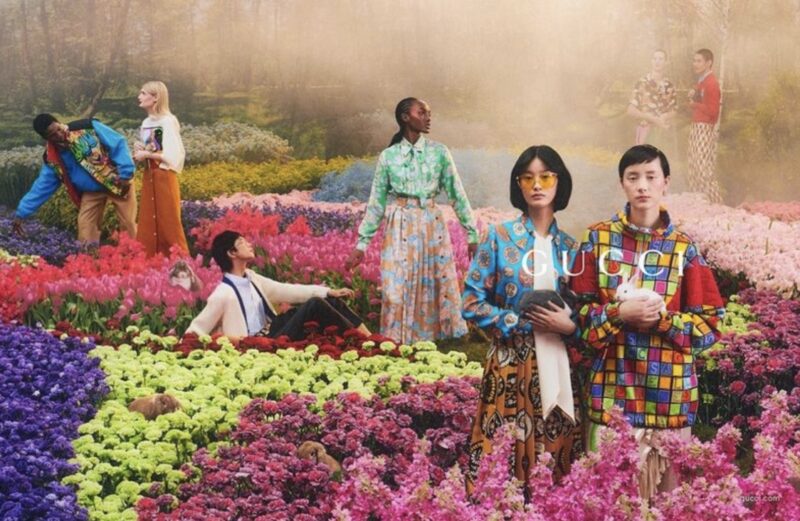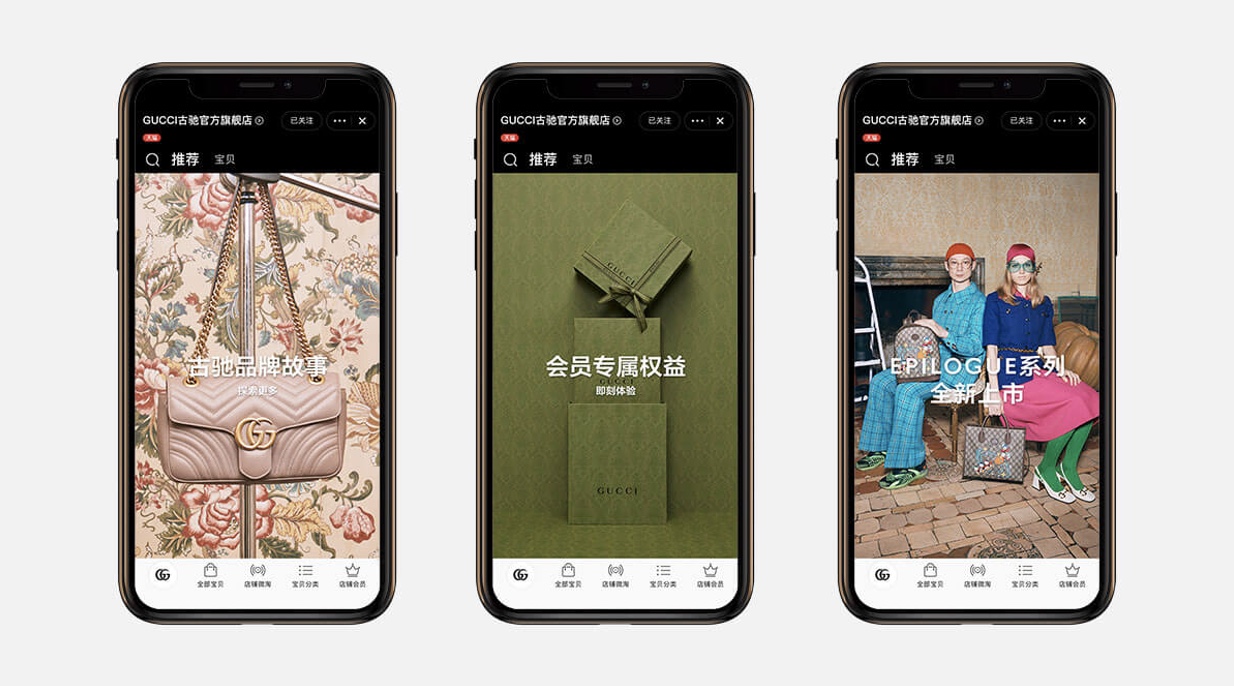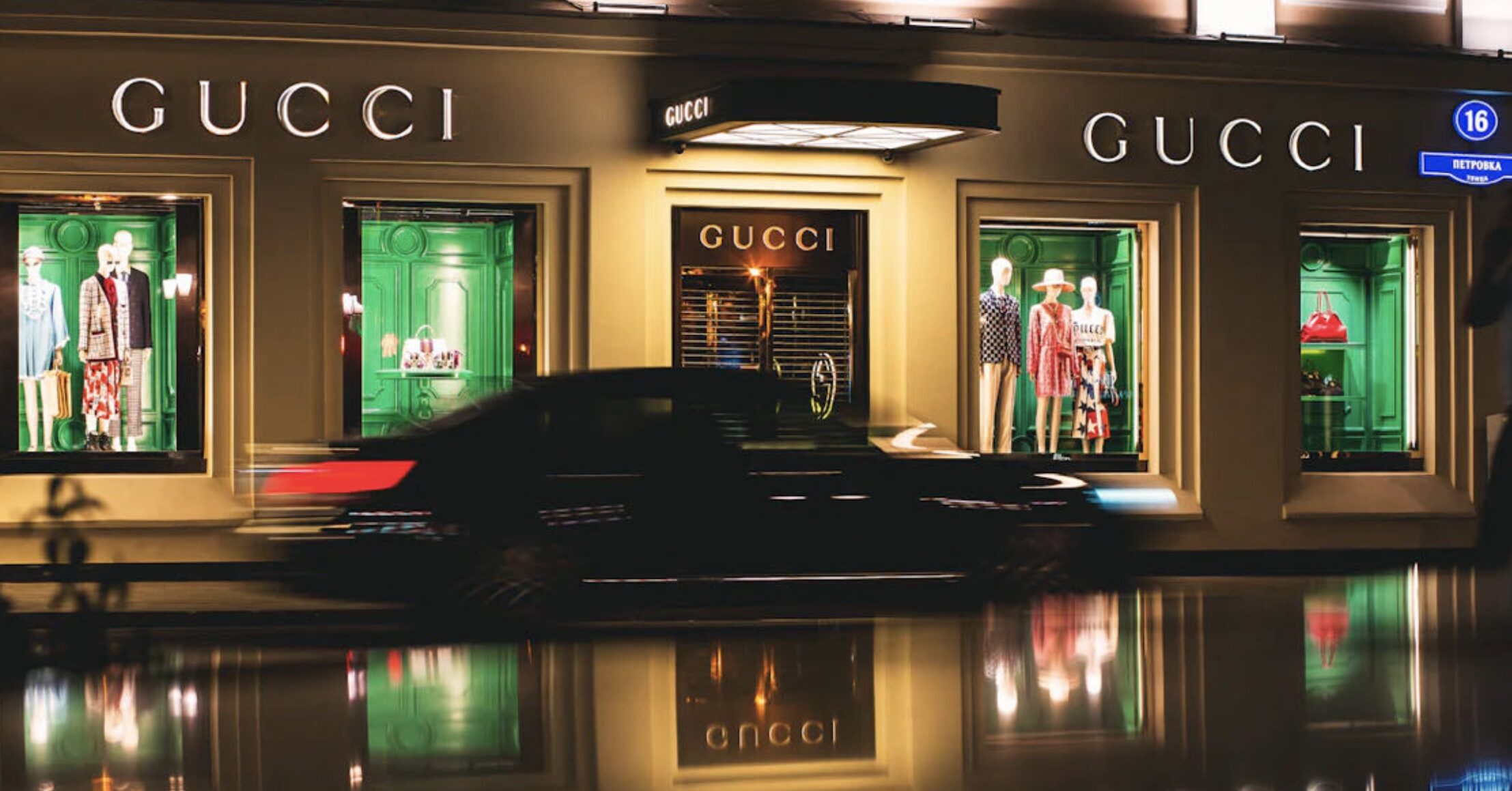The luxury goods sector has experienced significant growth in China over recent decades, triggered by a remarkable surge in disposable income. Consequently, renowned international luxury brands such as Coach, Hermès, and Prada have all strategically penetrated the Chinese market, seeking to capitalize on the burgeoning demand.
However, among the abundance of luxury brands vying for dominance, Gucci has emerged as a distinguished leader within the Chinese luxury landscape. Over the last 7 years, the Italian brand has consistently been celebrated as one of China’s most favored luxury brands. Under the visionary leadership of former CEO Marco Bizzarri and former creative director Alessandro Michele, the brand witnessed a meteoric rise in its financial performance, with revenues tripling during the 2015-2019 period.
Download our report on the future of China’s luxury market

This remarkable achievement has positioned Gucci at the forefront of the luxury market in China, granting it unparalleled visibility and influence compared to its competitors. According to estimates from Barclays, China represents approximately 35% of the Italian brand’s annual sales, a significant margin over the 27% attributed to fashion and leather goods sales for LVMH, and 26% for Hermès.
Bespoke elegance: A redesigned aesthetics for the Chinese market
A completely rebranded product design strategy
Gucci’s initial anchoring success in China can be credited to its adept strategy of aligning its brand image with the preferences of contemporary fashion consumers. The brand has set a benchmark in product and packaging design, exemplifying high standards across material selection, style innovation, and the entire production process. This commitment to quality and innovation has positioned the Italian fashion maison as a trendsetter within the luxury fashion industry.
Furthermore, Gucci in China has effectively captured the younger market segment by transitioning from traditional, formal styles to adopting a more vibrant, casual approach. This shift not only broadened its appeal but also marked a significant strategic pivot from its roots in bespoke tailoring to offering an expansive ready-to-wear collection, enhancing its accessibility without compromising the brand’s exclusive heritage.
Finally, the brand has shown to be able to quickly monitor the evolution of Chinese customers’ shopping habits. Gucci’s forward-thinking agility in keeping pace with Chinese consumer habits was especially exemplified during the Covid-19 pandemic, when the brand successfully anticipated a shift towards comfort-oriented fashion, by launching its own Run sneakers campaign.

A meticulously personalized and catered experience
Gucci’s success in China has also been significantly driven by the brand’s tailored approach to the Chinese market, recognizing its unique dynamics and consumer shopping preferences. First, by innovating its retail strategies through the popularization of immersive in-store experiences, the brand has allowed customers to actively engage and interact with its collections through augmented reality before experiencing craftsmanship first-hand.
Moreover, the Italian maison also started co-branding collaborations which considerably widened its market presence and enhanced its brand recognition. These partnerships have introduced exclusive collections that embody the essence of both brands, appealing to a broad audience. In June 2022, Gucci’s collaboration with Adidas, which led to the creation of a unique collection blending Gucci’s luxury aesthetic with Adidas’s iconic sportswear identity, strongly expanded younger demographics’ affinity with the brand.

Digital renaissance through a groundbreaking digital marketing strategy
An omnichannel approach to Chinese retail
During the early days of the pandemic, Gucci in China started opening new official online accounts beyond WeChat and Weibo. The brand’s online presence extended to the short video app platform Douyin and the social commerce platform Xiaohongshu (小红书).
Through all of these channels, the brand has demonstrated proficiency in executing a comprehensive cross-channel advertising campaign, where the company adeptly transitioned between various media platforms to optimize its engagement with a diverse user base. An exemplary illustration of such coordination occurred during Gucci’s advertising campaign for the Year of the Tiger in 2022.

The maison first launched a challenge on Douyin to engage users through a filter that featured the Gucci tiger and floral prints from its collection. In less than 5 days, the #Guccitiger campaign videos totaled 330 million views. The house simultaneously ran a campaign on Weibo where users could win virtual accessories exclusive to the campaign on their profile pictures. The hashtags used for this campaign, #CuteTigerProfilePhoto (#可爱虎头像) and #GucciTiger (#古驰虎), garnered respectively 240 million and 430 million views upon their publication. Finally, a WeChat mini-program was launched to engage users to access their predictions for the new year and personal product recommendations based on their horoscope. The brand has also released limited-edition virtual red envelopes, which users could send to family and friends.
Crafting a China-centric brand story
Gucci’s ascent in the luxury market is largely due to its nuanced and authentic brand narrative, particularly resonant within the Chinese market. The brand has emboldened the Guochao (国潮) trend, which consists of the growing popularity and appreciation of culturally Chinese-inspired products. By developing viral campaigns and content that aligns with Chinese cultural values and consumer preferences, The Italian maison not only promotes its products but also embeds itself into the fabric of consumers’ lives, fostering a sense of belonging and inviting them to partake in a shared brand experience.
Notably, the Italian brand’s storytelling initiatives, particularly its collaboration with Chinese pop IP Marsper for the Children’s Day campaign in 2023, have also exemplified its connection with Chinese cultural values and consumer desires. By creating collectible figurines that blend the iconic Gucci styles with a beloved Chinese character, the brand achieved 27 million views on Weibo, demonstrating a personalized and culturally relevant approach.

Moreover, Gucci’s Chinese New Year campaign in January 2023 further illustrates its prowess in creative storytelling, with a series of videos exploring diverse interpretations of love, anchored by the culturally significant color red. This campaign, featuring an array of products, highlights Gucci’s skill in weaving cultural symbols into its commercial approach, particularly emphasizing its strategy for the Year of the Rabbit by incorporating rabbit motifs throughout its product lines. This move not only showcases the brand’s diverse offerings but also cements its status as a brand that deeply resonates with its consumers’ identities and values.

Star power synergy: Gucci’s strategic alliances with influencers and celebrities
Gucci in China has adeptly leveraged partnerships with Key Opinion Leaders (KOLs) and celebrities to bolster its brand visibility and allure among younger consumers. The prestigious Italian luxury brand boasts an impressive roster of ambassadors who champion its clothing, accessories, and fragrance lines, showcasing Gucci’s collections on red carpets and promoting its global initiatives.
The selection of ambassadors is a strategic process, taking into account various criteria that resonate with the brand’s ethos, aesthetic appeal, and the demographic it seeks to engage. Ambassadors usually personify Gucci’s luxurious image and philosophical outlook. For instance, Ni Ni (倪妮;), a Chinese actress known for her role in the Chinese saga “The Flowers of War” (金陵十三钗) stands as a prime example of an ambassador who embodies the brand’s sophistication and core values.
Moreover, the popularity and digital footprint of potential ambassadors play a crucial role. The Italian maison typically opts for high-profile personalities boasting substantial social media influence to maximize the brand’s exposure and enhance its market desirability.
A glamorous debut on Alibaba’s Singles’ Day
In 2023, Gucci marked its debut on Alibaba’s Singles’ Day, aligning with over 200 luxury brands to offer exclusive products and benefits, including a 24-month interest-free installment option. Singles’ Day, the globe’s largest online shopping festival, sees Alibaba platforms drawing hundreds of millions annually. In 2023, a record 532 million consumers participated, offering Gucci unprecedented exposure to the Chinese market, and potentially enhancing its brand visibility and sales.
This decision to participate in the event on Alibaba’s Tmall platform, signifies a notable shift for the Italian brand, diverging from its traditional emphasis on exclusivity and in-person shopping experiences, reflecting a cautious yet strategic engagement with e-commerce platforms.
However, Gucci’s decision to participate in Alibaba’s flagship event also reflects a deliberate adaptation to evolving market shifts in consumer preferences towards digital commerce. By embracing digital platforms like Alibaba, the Italian maison has effectively been able to leverage newly sophisticated digital marketing tools, including AI-driven product recommendations and live streaming to further personalize its customer digital shopping experiences.

Navigating nuances: Gucci’s rising challenges and opportunities in the Chinese market
During the COVID-19 pandemic, Gucci faced a notable decline, more severely than its competitors, largely due to its heavier dependence on the Chinese market. Yet, the brand witnessed a significant recovery in 2021, with a revenue increase of 31% to EUR 9.7 billion, exceeding its pre-pandemic levels. Despite concerns over China’s economic slowdown, the fashion sector maintains robust consumer engagement, with predictions still favoring China to become the luxury market’s largest by 2025, albeit with a shift towards more value-conscious purchasing behaviors.
In light of its reliance on China, Gucci is recalibrating its strategy to reduce market vulnerability. As such the maison is actively diversifying its global market presence and enhancing its digital and direct-to-consumer channels. The brand’s Governance structure has also evolved. The hiring of Laurent Cathala, a former Tiffany executive, to spearhead Gucci’s Chinese operations signals a strategic pivot towards enhancing local market efforts. This involves granting more autonomy to local teams for marketing and advertising, diverging from the centralized decision-making traditionally practiced by European executives. This strategy aims to foster a deeper cultural resonance and connectivity with Chinese consumers, underscoring the critical role of cultural insight in brand strategies.
Looking ahead: The Italian brand’s unique hand-book for sustained success in China
- Gucci’s successful rise as a leader in China’s luxury market is attributed to strategic branding, visionary leadership, and alignment with Chinese consumers’ tastes and aspirations.
- Through innovative product design, digital marketing, and immersive retail experiences, the company has effectively captured the younger demographic and rebranded itself to adapt to evolving consumer preferences.
- The Italian fashion maison’s engagement with digital commerce and social media, including Alibaba’s Singles’ Day and influencer collaborations, has expanded its reach and consumer appeal.
- The brand’s pivot to a more localized marketing approach, focusing on cultural resonance and market responsiveness, is a moving pivot that will be closely watched by the industry for potential insights it may offer to other brands.






